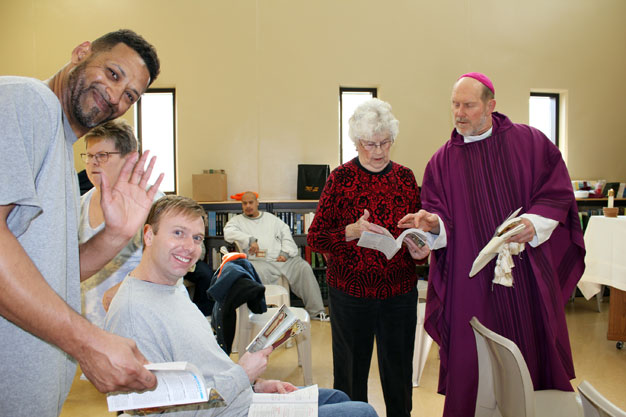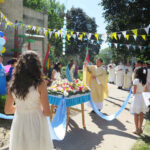
By Barb Arland-Fye
The Catholic Messenger
FORT MADISON — Nine offenders mingle inside the simple, airy room that serves as a chapel of the Iowa State Penitentiary when Bishop Thomas Zinkula arrives for the small Catholic community’s annual pre-Christmas Mass and dinner. A couple of offenders who usually attend the celebration are missing. They have left the prison, perhaps a sign of hope for those who remain behind, Deacon Bob Gengenbacher of Holy Family Parish in Fort Madison tells a reporter later. Many men incarcerated in this maximum-security facility are serving long sentences, some for life.
Bishop Zinkula reaches out to shake hands with each offender, then sets up for Mass with Father Joseph Phung, pastor of Holy Family Parish, and Deacon Gengenbacher. The deacon leads the Catholic prison ministry team at the Fort Madison prison. He took over when Deacon David Sallen moved out of the diocese. “I’m there to bring Jesus, to bring the Gospel to them,” Deacon Gengenbacher says.
Priests in the area take turns celebrating Mass the second Wednesday of each month. Deacon Gengenbacher leads a Communion service on the fourth Wednesday with assistance from other volunteers from Holy Family Parish. They hope to offer services weekly.
Father Phung announces that Bishop Zinkula will hear confessions in a separate room for anyone who wants to receive the sacrament of reconciliation. As they wait, Deacon Gengenbacher chats with the offenders, teasing them about their baseball team choices. He said he heard that the Cardinals were taken off ESPN (the sports news channel) and put on the History channel. The men laugh.
Carleen Mayer, a volunteer who plays the piano during Mass, asks an offender named Erik about his unusual-looking beard. “Is that a Manchu?” He smiles, tugs on the beard, and says, “Yes.” Erik transferred here last year from Anamosa State Penitentiary. He has 30 more years to serve in prison.
“I hardly went to church at Anamosa,” he says. At Fort Madison, he participates regularly “to be able to cleanse my soul and find inner peace.” He wears a medal featuring the image of Our Lady of Guadalupe, whose feast day is Dec. 12 — the day after this Mass. Erik says his middle name is Guadalupe. “Tomorrow is my second birthday.”
Bishop Zinkula returns from hearing confessions and shows his miter to the men. He figures they will appreciate one of the visible signs of the office of bishop. Half-kiddingly, he says he did not think he would have gotten his crosier into the prison.
He is celebrating the Mass for the second week of Advent. The bishop explains Advent prepares the faithful for the coming of Christ. “In between Jesus’ first and second comings, he comes to us in many different ways, like Scripture, Eucharist, reconciliation, and where two or three are gathered together in his name. He brings us peace and joy and mercy.”
Offenders read the first and second readings and responsorial psalm. Deacon Gengenbacher proclaims the Gospel. Bishop Zinkula delivers the homily, focusing on the message of hope that the Scriptures convey.
“We hear a lot about hope every election season,” the bishop says. “Political candidates always make unrealistic promises. … They promise change on the cheap. They tell us they can deliver justice and prosperity for all without asking voters to make sacrifices or hard choices. There is a lot of hope in the Scripture readings. Isaiah paints a picture of a reign of justice and faithfulness where wisdom and harmony sprout and grow. … Isaiah’s listeners hoped for a Messiah to come and make the Kingdom of God possible.”
David, an offender, says later that he wondered why the bishop talked about political candidates and elections when that is not a part of the offenders’ world. However, as the bishop’s homily continued, David said the message of hope became very clear. The bishop reflected on the movie, “The Shawshank Redemption,” focusing on two prisoners — one who concluded that “hope is a dangerous thing” and the other, an innocent man who suffered deeply in prison but never lost hope. “Inside the chapel of his soul, this convict … stores the most precious of all things — hope.”
“The lesson of The Shawshank Redemption and Advent is that real hope begins with a willingness to change. Gandhi said that we should be the change we wish to see in the world. Our faith calls us to become the change that makes other change possible,” the bishop says. “Unlike the cheap hope offered by all too many politicians and eagerly embraced by all too many voters, The Shawshank Redemption and the Gospel offer visions of hope based on a willingness to live differently, to make hard choices and to embrace serious sacrifices.”
That message of hope resonates with David, who says that for people serving a long sentence in prison (which he is), “you can’t ever give up hope. You always have to have hope.” He says Deacon Bob and Deacon Dave before him told the offenders “Christ gives hope, as long as you are willing to accept him in your life.”
Father Phung says he feels blessed to have an opportunity to celebrate Mass with the offenders and to visit with them a couple of times a year. “They see you and know you and smile at you.” The bishop’s presence, he adds, helps Catholics throughout the diocese to be “aware of the people here, members of the church here that we need to pray for and support.”
David, an offender, says later that he wondered why the bishop talked about political candidates and elections when that is not a part of the offenders’ world. However, as the bishop’s homily continued, David said the message of hope became very clear. The bishop reflected on the movie, “The Shawshank Redemption,” focusing on two prisoners — one who concluded that “hope is a dangerous thing” and the other, an innocent man who suffered deeply in prison but never lost hope. “Inside the chapel of his soul, this convict … stores the most precious of all things — hope.”
“The lesson of The Shawshank Redemption and Advent is that real hope begins with a willingness to change. Gandhi said that we should be the change we wish to see in the world. Our faith calls us to become the change that makes other change possible,” the bishop says. “Unlike the cheap hope offered by all too many politicians and eagerly embraced by all too many voters, The Shawshank Redemption and the Gospel offer visions of hope based on a willingness to live differently, to make hard choices and to embrace serious sacrifices.”
That message of hope resonates with David, who says that for people serving a long sentence in prison (which he is), “you can’t ever give up hope. You always have to have hope.” He says Deacon Bob and Deacon Dave before him told the offenders “Christ gives hope, as long as you are willing to accept him in your life.”
Father Phung says he feels blessed to have an opportunity to celebrate Mass with the offenders and to visit with them a couple of times a year. “They see you and know you and smile at you.” The bishop’s presence, he adds, helps Catholics throughout the diocese to be “aware of the people here, members of the church here that we need to pray for and support.”











